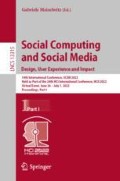Abstract
In recent years, SNS has become a service that everyone uses. In this study, we analyze Twitter, one of the most popular SNSs, which allows users to post their daily events and feelings within 140 characters and is used by people all over the world. In this study, we investigate the relationship between SNS posts and latent approval needs. The linguistic features of tweets and their contextual features are analyzed using information such as the frequency of posts and the number of characters in tweets, and the degree of desire for approval is defined and quantified based on the results of the analysis of tweets. The experiment results show that the agreement between the naïve Bayes classifier and human ratings was about 60%. It is found that users with a high percentage of posts for approval desire tend to post less frequently and with a higher average number of characters. This indicates that it may be because these users post for approval desire when it is important or when they really want to say something.
Access this chapter
Tax calculation will be finalised at checkout
Purchases are for personal use only
References
Kato, C.: SNS use of young people as seen from praise seeking need and rejection avoidance need. Memoirs Hokuriku Gakuin Univ. 7, 315–323 (2014). (in Japanese)
Kanoh, H.: The relationship between approval desire and social media use. Res. Rep. Inform. Educ. 1, 18–23 (2019). (in Japanese)
Valkenburg, P.M., Pouwels, J.L., Beyens, I., van Driel, I.I., Keijsers, L .: Adolescents’ social media experiences and their self-esteem: a person-specific susceptibility perspective. Technol. Mind. Behav. 2(2) (2021)
Nemoto, T., Fujimoto, T.: The mechanism of approval seeking posting guided by present SNS analysis. Inf. Eng. Expr. Int. Inst. Appl. Inform. 5(2), 36–45 (2019)
Kim, J., Hastak, M.: Social network analysis: characteristics of online social networks after a disaster. Int. J. Inf. Manage. 38(1), 86–96 (2018)
Yum, S.: Social network analysis for coronavirus (COVID-19) in the United States. Soc. Sci. Q. 101(4), 1642–1647 (2020)
Ahmed, W., Vidal-Alaball, J., Downing, J., Seguí, F.L.: COVID-19 and the 5G conspiracy theory: social network analysis of twitter data. J. Med. Internet Res. 22(5), e19458 (2020)
Saqr, M., Fors, U., Nouri, J.: Using social network analysis to understand online problem-based learning and predict performance. PLoS ONE 13(9), e0203590 (2018)
Jing, N., Wu, Z., Lyu, S., Sugumaran, V.: Information credibility evaluation in online professional social network using tree augmented naïve Bayes classifier. Electron. Commer. Res. 21(2), 645–669 (2019). https://doi.org/10.1007/s10660-019-09387-y
Samsir, et al.: Naives Bayes algorithm for twitter sentiment analysis. J. Phys. Conf. Ser. 1933(1), 012019 (2021)
Tago, K., Takagi, K., Kasuya, S., Jin, Q.: Analyzing influence of emotional tweets on user relationships using Naive Bayes and dependency parsing. World Wide Web 22(3), 1263–1278 (2018). https://doi.org/10.1007/s11280-018-0587-9
Author information
Authors and Affiliations
Corresponding author
Editor information
Editors and Affiliations
Rights and permissions
Copyright information
© 2022 The Author(s), under exclusive license to Springer Nature Switzerland AG
About this paper
Cite this paper
Murata, E., Tago, K., Jin, Q. (2022). Linguistic and Contextual Analysis of SNS Posts for Approval Desire. In: Meiselwitz, G. (eds) Social Computing and Social Media: Design, User Experience and Impact. HCII 2022. Lecture Notes in Computer Science, vol 13315. Springer, Cham. https://doi.org/10.1007/978-3-031-05061-9_24
Download citation
DOI: https://doi.org/10.1007/978-3-031-05061-9_24
Published:
Publisher Name: Springer, Cham
Print ISBN: 978-3-031-05060-2
Online ISBN: 978-3-031-05061-9
eBook Packages: Computer ScienceComputer Science (R0)

